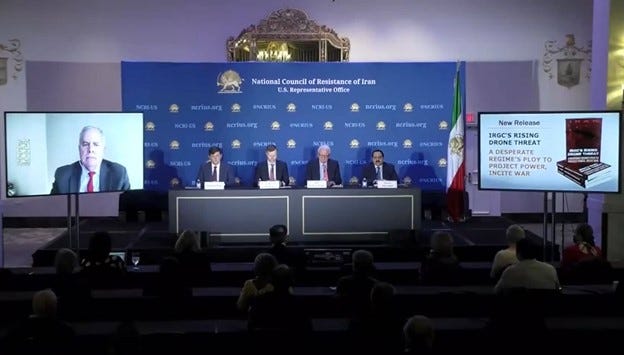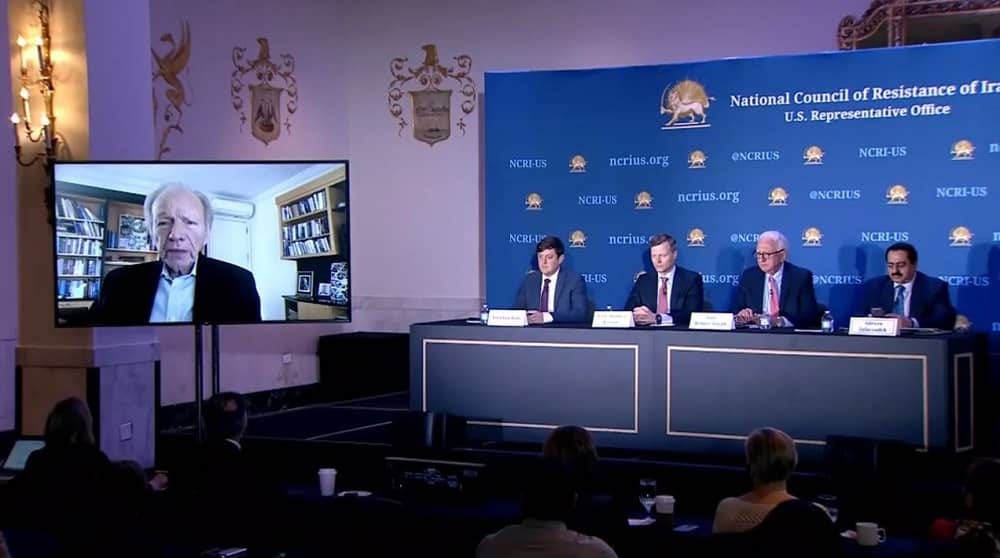Iran escalating drone use to strike targets across the Middle East: opposition NCRI

Iran is using drones in targeted attacks against sites in Lebanon, Iraq, Yemen, and Saudi Arabia, according to a new book published by the Iranian opposition coalition National Council of Resistance of Iran (NCRI). A distinguished panel of U.S. dignitaries shared their thoughts on this growing threat from Iran parallel to world powers negotiating a possible revival of the 2015 nuclear deal.
The NCRI report identifies 15 civilian companies being used by the Revolutionary Guards (IRGC) as “fronts” to provide for and advance Iran’s drone program.


- Iranian Aviation & Space Industries Association
- Iranian Aviation & Space Industries Working Group
- Iranian Research Organization for Science and Technology
- Iravin Innovation and Acceleration Center
- Farnas Pasargad Aerospace Industries Company
- Bal Gostar Negah Asemanha Technology
- Kharazmi Electronics Industries
- Iran Bekr Part Khavar Mianeh
- Sahfa Production-Distribution Cooperative Company — Iranian Aerospace Industries
- Aras Tech Aircraft Maintenance Services Company
- Maham Pergas Technology
- Hezareh Sevvom Industrial Alloy Development Company
- Nazari Titanium Company
- Sara Safe Tools
- Noandishan Composite Structures Industrial-Production
The NCRI’s new book, “Iran: IRGC’s Rising Drone Threat: A Desperate Regime’s Ploy to Project Power, Incite War” sheds important light into various aspects of Tehran’s use of this initiative to pursue its political objectives. The panel in Washington called on the international community to adopt a strong position against Tehran’s “reckless violations” of the 2015 nuclear deal, better known as the Joint Comprehensive Plan of Action (JCPOA), and the regime’s belligerent drone program.

On the night of December 14, the U.S. military shot down a small drone that was believed to be threatening a U.S. outpost in southern Syria Tuesday, just weeks after the same base was attacked by drones and rocket fire. Iran or Iranian-backed militia groups are suspected to be behind both the earlier attack and Tuesday's drone incident, according to defense officials, according to NBC News.
The panelists have gone as far as saying U.S. President Joe Biden should have a military option on the table in order to place pressure on Iran and use this leverage to force the mullahs to retract from their pursuit of nuclear weapons and aggressive drone program.
Hosted by the NCRI, the panel featured former Senator Joseph Lieberman; Robert Joseph, a former undersecretary of state for arms control and international security; David Shedd, former acting director of the Defense Intelligence Agency; Professor Matthew Kroenig of Georgetown University; and Jonathan Ruhe, foreign policy director for the Jewish Institute for National Security of America.
NCRI Deputy Director Alireza Jafarzadeh emphasized that despite the fact that Iran is expanding its drone program and continuing its push for nuclear weapons, unlike what may meet the eye the regime is “much weaker than it was in 2015.”
That weakness is rooted in the existence of resistance groups inside Iran that are active in providing extensive details on the regime’s various programs, including the nuclear and drone campaigns, that the NCRI can gather and share with the world over.
“Iran is in serious violations of the agreements worked out in 2015. They have been in violation since day one. All the evidence shows they have three new (nuclear program) sites,” Jafarzadeh indicated.
“The Biden administration should make democracy and human rights a central element of its foreign policy regarding Iran instead of trying to find a way to deal with the repressive regime,” Jafarzadeh said, adding the international community should raise charges of war crimes against Iranian President Ebrahim Raisi, who should be held accountable for his policies and past genocide.
Raisi is widely accused of crimes against humanity and genocide his direct role in the summer 1988 massacre of over 30,000 political prisoners as a senior member of the regime’s notorious “Death Commission,” which determined the fate of political prisoners in two-minute kangaroo trials and sentenced thousands of political prisoners to their deaths.
The NCRI has published a detailed study of how Iran is using drones to strike targets in Lebanon, Iraq, Yemen and Saudi Arabia, and establishing long-term alliances with China, Russia and Venezuela.
“This is causing worry among our allies in the region that they can’t depend on us,” Sen. Lieberman said in his remarks to the NCRI forum in Washington. “We’re on the wrong course in the US in our efforts in Vienna to re-enter the JCPOA (nuclear deal) … they don’t meet the realities of what Iran is doing in Vienna or the world. They are highly risky. It’s not only important that the US toughens our position, to step back from the negotiations as they are happening now, but also to move toward more containment and constraints against the regime,” he added.


“The Iranian regime that now returns to the JCPOA in Vienna is a regime that has recklessly violated the most compelling and important terms of the agreement, enriching uranium to a very dangerous level,” Sen. Lieberman highlighted.
The best strategy forward would be to stand alongside the Iranian people and strengthen the expanding resistance network inside Iran, argued Amb. Joseph while describing the mullahs as “a deplorable regime.” The resistance network has been implementing increasing pressure on the regime, which is taking advantage of the ongoing Vienna talks to buy necessary time to expand its nefarious nuclear, ballistic missile, and drone programs, he emphasized.

“The (Biden) administration should step back from the negotiations and define success. Right now, we are projecting weakness,” Amb. Joseph said during the following Q&A session.
The US needs to escalate pressure on the Iranian regime, argued Professor Kroenig. “We are relying too heavily on the engagement (negotiations) tract. We should put the military option back on the table. President Biden should say he is willing to use force,” Kroenig explained.
“We need to have a stronger pressure track. The regime needs to understand that if it remains on its current path, there will be consequences. Supporting the democratic aspirations of the Iranian people is important. And, finally, we must keep a military option on the table as a last resort to prevent Iran from building a nuclear weapon,” he concluded.

The Biden administration should define a deadline for the Vienna talks “after which it would be prepared to set up credible military actions,” said Ruhe, joining in agreement with other panelists that Iran’s regime is not serious in the talks over a return to the 2015 nuclear deal. On Iran’s use of drones to attack targets, Ruhe said studies indicate the frequency has tripled in recent years.
“Iran’s use of drones in the region tries to project strength abroad and compensate for its weaknesses at home. Drones of the type Iran uses for attacks are often referred to as the poor-man’s cruise missile,” he explained.
“Iran has improved its drone and missile capabilities in the five years it has enjoyed the benefits of the nuclear agreement. It increasingly uses drones and missiles in mixed swarms… Today, Iran uses drones in 60 percent of its attacks across the Middle East. We need genuine sanctions enforcement on Iran’s capabilities to procure the material for these activities,” Ruhe emphasized.
U.S. lawmakers accuse the Biden State Department of turning a blind eye to Iran's terrorism enterprise in a bid to avoid agitating Tehran as talks over a new version of the 2015 nuclear accord are ongoing in Vienna, according to The Washington Free Beacon.
The NCRI released a six-page summary of its new book, concluding that the 2015 nuclear deal has filed to force Iran’s regime to disband its nuclear weapons program or aggressive drone expansion. In fact, the money Iran obtained from the JCPOA has allowed it to further fuel such belligerent initiatives.





